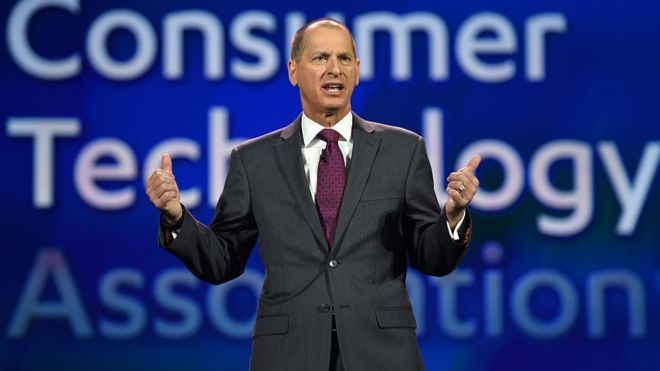
The UK government’s lack of support for start-ups attending the CES tech show is a “source of embarrassment”, according to the event’s organiser.
Gary Shapiro compared the country unfavourably with France, the Netherlands and Israel.
The head of one British firm at the Las Vegas event said the criticism was well-founded.
But the UK’s Department for International Trade said it was providing “targeted support”.
CES is one of the tech calendar’s biggest fixtures and provides companies with a chance to meet and secure orders from retailers, as well as to gain publicity by showing their products to journalists and analysts.
About 177,000 people are expected to take part in this year’s show, which runs until Sunday.
‘Short-sighted’
There are nearly five times as many French companies attending this year’s CES as British ones.
Mr Shapiro said there had been an annual increase in numbers over the past few years thanks to Paris making greater effort to help its entrepreneurs.
“Now we’re starting to see other countries take notice,” the president of the Consumer Technology Association added.
“We’ve seen that the Netherlands and others going in there big time [this year].
“Britain’s been a little slow to the game honestly. We have a minister from Britain coming but there’s not a lot of activity that we’ve seen at CES.
“I think it’s a source of embarrassment.
“When I was in London recently, I raised it with one of the ministers, and they said: ‘Yeah, it’s amazing. I can get approval to go to [Texas festival] South by Southwest, but because it’s Las Vegas, for some reason it’s frowned upon.’
“And that’s a pretty short-sighted attitude.”
Bespoke help
CES charges a discounted rate for stands in its Eureka Park start-up zone.
At this year’s show, there are French, Ukrainian, Czech, Saudi Arabian, Dutch, Israeli, New Zealand and US stands organised by government-backed agencies to promote local talent.
But a spokeswoman for the UK’s Department for International Trade (DIT) said it thought it was more effective for UK attendees to base themselves elsewhere in product-themed areas.
“The UK continues to be a world-leader in the tech and innovation industry, and events like CES can provide UK businesses with vital contacts to build their brand abroad,” she said.
“We want to help UK businesses make the most of trade and investment opportunities including in the US, through targeted support and bespoke business matching that better maximises their presence to win vital contracts abroad.”
The spokeswoman added that the minister for digital and culture, Matt Hancock, would meet British exhibitors when he stopped in for half a day before travelling on to meet music industry leaders in California.
Travel costs
But at least one UK start-up is dissatisfied.
Smarter Applications is launching a fridge webcam at CES that alerts owners to when food nears its expiry date.
“We’ve been invited to networking drinks from the Holland embassy and plenty of other European countries that have a presence there and support [their start-ups] by doing networking events,” said Isabella Lane, managing director of the firm.
“We don’t have anything of that ilk and there is no UK government base over at CES.
“In France they are supported financially to go to those events and we are not.”
By contrast, Bluemint Labs – a Grenoble-based start-up – praised the French government for the support it was receiving.
“The government provides the label La French Tech, which helps with branding,” said its marketing manager Pavithra Govindarajan.
“This label helps get more exposure and adoption among the big retailers in France.
“The regional governments also play their part.
“For the region Auvergne-Rhone-Alpes, the body Minalogic is supporting select start-ups by paying back some part of the travel and accommodation costs. It is also helping set up meetings with major brands, which otherwise would have been very tough.”
More than money
Ms Lane said Smarter Applications was spending about £40,000 on CES, and that budget covered a private meeting room but not a show floor stand.
She acknowledged that there were grants available to the UK tech sector but added that they were difficult to qualify for.
“You have to fit very particular requirements, and as a hardware-software smart home start-up we didn’t quite meet them,” she explained.
But Mr Shapiro stressed he was not calling on the UK to subsidise its young companies’ CES appearances.
“Government support is just not funding, I want to make that very clear,” he explained.
“It’s political leadership. It’s showing up.
“It’s a matter of [attracting] attention. We’re having the prince of the Netherlands show up, for example.
“I don’t know why the UK is not responding, because there is a tremendous amount of innovation there.
“I think there’s a great opportunity for the UK, which is untapped.”
There’s no doubt there are British firms represented at CES – even as I checked in for my flight to Las Vegas an enthusiastic group from Southampton University’s tech incubator pitched me their wares.
Later today, I’m meeting a young British solo entrepreneur who’s flown here with his own funds to promote what sounds like a very clever wireless earpods product.
But what seems lacking this year is much help from the British government for start-ups wanting to make the trip.
In previous years there had at least been a UK Trade & Investment stand.
Looking at the floor plans for the show I can see representatives from Israel, the Czech Republic and every corner of France – but it looks as though the Union Flag will not be flying.
You can guarantee however that British electronics retailers will be at the show in force, on the lookout for the hot products of 2017 – but they may have to look long and hard for anything home-grown.
[Source:- BBC]
















